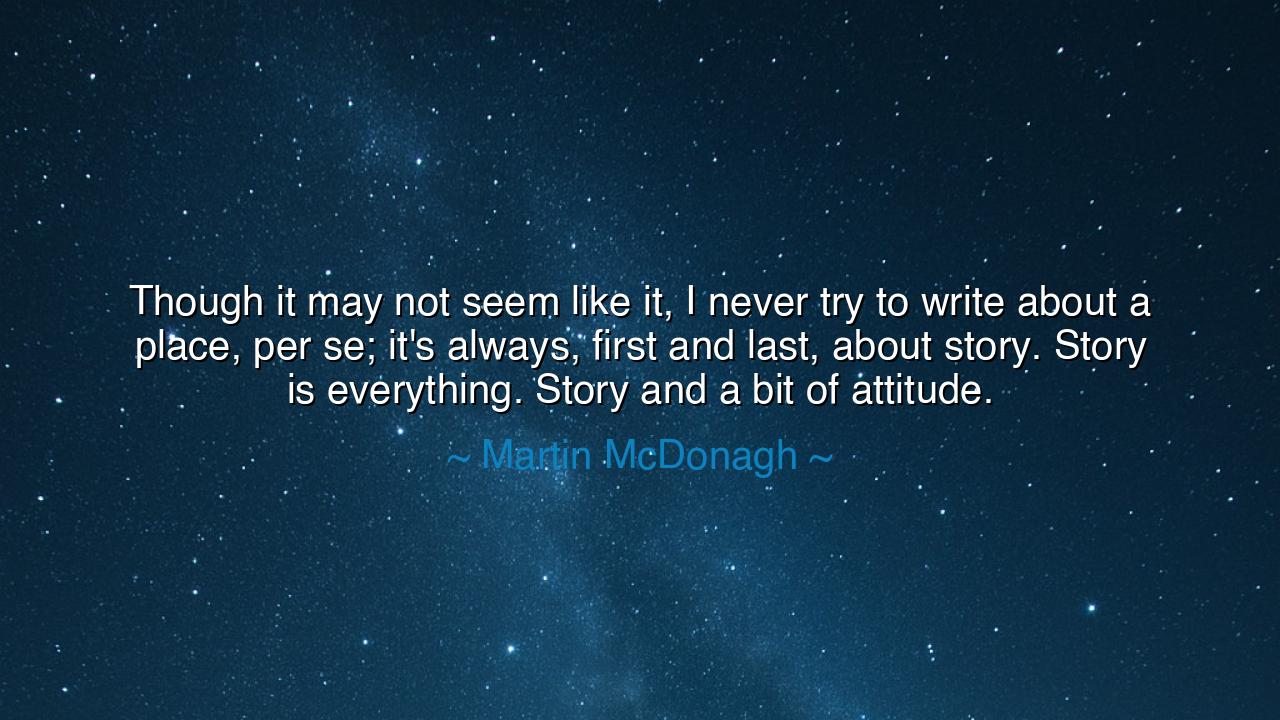
Though it may not seem like it, I never try to write about a
Though it may not seem like it, I never try to write about a place, per se; it's always, first and last, about story. Story is everything. Story and a bit of attitude.






Host: The room was quiet, the soft light of the lamp casting a warm glow across the table. Outside, the world had quieted, and the peaceful rhythm of the evening settled in. Jeeny sat at the table, her fingers gently tracing the rim of her cup, lost in thought. Jack, standing by the window, gazed out at the darkened world, his posture relaxed but his mind clearly absorbed in reflection. There was an unspoken understanding between them, as though the conversation was about to unfold into something deeper.
Jeeny: (breaking the silence, her voice calm but reflective) “I came across something by Martin McDonagh today that really made me think. He said, ‘Though it may not seem like it, I never try to write about a place, per se; it's always, first and last, about story. Story is everything. Story and a bit of attitude.’ What do you think about that?”
Jack: (pauses, his voice thoughtful) “It’s such an interesting perspective, isn’t it? McDonagh seems to be saying that the setting—whether it’s a specific location or a particular time—doesn’t matter as much as the story itself. The essence of what makes a piece of writing compelling is not where it happens, but what happens and how it happens. In that sense, story is universal. It transcends time and place, and it’s the characters and their attitudes that make the story come alive.”
Jeeny: (nodding slowly) “Exactly. McDonagh is prioritizing the narrative over the details of the world it’s set in. It’s a reminder that a good story doesn’t depend on the context; it depends on the characters, their motivations, and the conflicts they face. The setting is important, of course, but the story itself is what drives everything forward. He’s saying that story should be the heart of everything, and everything else, including the setting, serves to enhance that story.”
Host: The stillness in the room deepened, as the conversation unfolded. Jack turned slightly toward Jeeny, his expression softening as he considered the broader meaning of McDonagh’s words. Outside, the world had quieted, but inside, the conversation had taken a more introspective turn, reflecting on the power of storytelling and its role in shaping meaning.
Jack: (his voice quieter now, more introspective) “What strikes me is how McDonagh is pushing back against the idea that the place is what defines a story. So often, writers, filmmakers, and even audiences get caught up in the setting, in trying to capture something specific about a location or culture. But McDonagh is saying that good stories don’t need all that. They just need good characters, a compelling conflict, and a bit of attitude. If those elements are in place, the story will speak for itself, regardless of where it’s set.”
Jeeny: (softly) “Yes, and I think it’s a reminder that a story isn’t just about what happens—it’s about how it happens and the people it happens to. The location, the time, the details—they’re just the framework. What makes a story impactful is the emotional truth it conveys. If the characters feel real, if the situation resonates with us, the place where it happens becomes secondary.”
Jack: (nodding slowly) “Exactly. And there’s also something about that ‘bit of attitude’ that McDonagh mentions. It’s not just the story itself, but the tone and the point of view that give it its power. Storytelling is about perspective, about the way the world is filtered through a character’s eyes. That’s what makes it alive. The attitude of the storyteller—their approach, their voice—shapes the entire narrative.”
Jeeny: (smiling gently) “Yes, the attitude is everything. It gives the story color, emotion, and depth. Even the most simple or familiar stories can feel fresh and exciting if told with a unique attitude or a distinctive voice. It’s not just about the events of the story, but about the way those events are framed and the energy behind them.”
Host: The quiet between them grew deeper now, as the conversation continued to unfold. Outside, the world had quieted, but inside, the room was filled with a shared understanding about the nature of storytelling. Jeeny and Jack had uncovered a deeper meaning in McDonagh’s words—that the heart of any story lies in its narrative, its characters, and the unique perspective through which it’s told. The setting and other details are secondary to the power of story itself.
Jack: (smiling softly, his voice more assured) “It’s a reminder that storytelling is about what matters most. When we focus on the characters and the essence of the story, everything else just falls into place.”
Jeeny: (nodding warmly) “Exactly. The power of a good story doesn’t lie in the external world—it lies in the emotional depth and the voice of the characters. It’s the story that speaks to us, not the place it’s set in.”
Host: The world outside had quieted to a peaceful stillness, but inside, the room was filled with understanding. Jeeny and Jack had uncovered the truth in McDonagh’s words—that a story is about more than the setting; it’s about the characters, the conflicts, and the unique perspective through which we see the world. The night continued outside, but inside, the room felt full of the realization that the essence of storytelling lies in its heart and attitude, not the place it takes place.






AAdministratorAdministrator
Welcome, honored guests. Please leave a comment, we will respond soon